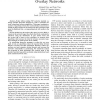Free Online Productivity Tools
i2Speak
i2Symbol
i2OCR
iTex2Img
iWeb2Print
iWeb2Shot
i2Type
iPdf2Split
iPdf2Merge
i2Bopomofo
i2Arabic
i2Style
i2Image
i2PDF
iLatex2Rtf
Sci2ools
COLCOM
2009
IEEE
2009
IEEE
Still alive: Extending keep-alive intervals in P2P overlay networks
Abstract—Nodes within existing P2P networks typically exchange periodic keep-alive messages in order to maintain network connections between neighbours. This paper investigates a number of algorithms which allow each individual connections to extend the interval between successive keep-alive messages based upon the likelihood that a corresponding node will remain in the system. Several studies have shown that older peers are more likely to remain in the network longer than their short-lived counterparts. Therefore using the distribution of peer session times and the current age of peers as key attributes, we propose three algorithms that increase the interval between successive keepalive messages as nodes become more reliable. By prioritising keep-alive messages to nodes that are more likely to fail, our algorithms reduce the expected delay between failures occurring and their subsequent detection. Failed connections can incur expensive lookup timeouts and increases the network’s v...
COLCOM 2009 | Distributed And Parallel Computing | Keep-alive Messages | Periodic Keep-alive Messages | Successive Keep-alive Messages |
| Added | 21 Jul 2010 |
| Updated | 21 Jul 2010 |
| Type | Conference |
| Year | 2009 |
| Where | COLCOM |
| Authors | Richard Price, Peter Tiño |
Comments (0)

